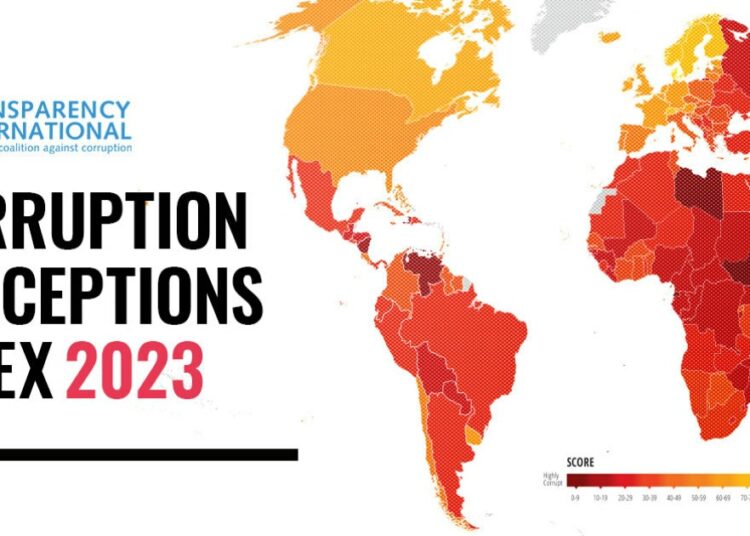Nigeria has recorded a slight but insignificant improvement in the 2023 Corruption Perception Index (CPI) compiled by the Transparency International (TI) yet civil society organisations are worried about the pervasive corruption in the country.
This was disclosed at a news conference in Abuja yesterday by the Civil Society Legislative Advocacy Centre (CISLAC), the Nigerian chapter of the TI. The index reveals that Nigeria scored 25 out of 100 points in the 2023 CPI, compared to 24 points in the 2022 CPI, while Nigeria ranks 145 out of 180 countries compared to 150 on the 2022 CPI results.
“Nigeria’s score is below the Sub- Saharan African average of 33 points. Most African countries showed stagnation, Ninety percent of countries in sub-Saharan Africa scored under 50,” the report said.
The executive director of CISLAC/TI-Nigeria, Auwal Ibrahim Musa Rafsanjani, in company of other civil society groups noted that that slight improvement was due to some measures taken by the government to curb the menace of corruption.
Some of the other CSOs include; Accountability Lab Nigeria, represented by its country director, Friday Odeh; Centre for Fiscal Transparency and Integrity represented by its executive director, Umar Yakubu; Budgit Foundation Nigeria, represented by senior programme manager, Ama Ekheoveh and Ade Adesomoju, head Anti-corruption and Human Rights, Premium Times.
The CSOs lamented that corruption is still very much prevalent in Nigeria in the public sector especially in the judiciary, electoral corruption and the massive corruption in the civil service, adding that the insecurity ravaging most parts of the country is a direct consequence of corruption in Nigeria.
The CPI for Nigeria aggregates data from 8 (eight) different sources that provide perceptions by country experts and business people on the level of corruption in the public sector, the report said.
These sources are: Bertelsmann Foundation Transformation Index, Economist Intelligence Unit Country Ratings, Global Insights Country Risk Ratings, PRS International Country Risk Guide and Varieties of Democracy Project.
Others include World Bank Country Policy and Institutional Assessment (CPIA), World Economic Forum Executive Opinion Survey (EOS) and World Justice Project Rule of Law Index.
It said the CPI report of this year is not an assessment of Nigeria’s anti-corruption agencies, which it said are making commendable efforts in the fight against corruption in Nigeria.
The CISLAC/TI-Nigeria listed key areas to explain why Nigeria showed some improvement and areas where gaps persist. Some of the positives include; the launch of the Beneficial Ownership Register; vibrant media, civil society and citizenry in demanding transparency and accountability; arrests and recoveries by anti-corruption agencies.
It noted however, that there are pervasive weaknesses leading to corruption in the electoral system, which dashed the hope of the citizenry when the Independent National Electoral Commission (INEC) failed to rise up to expectation during the 2023 elections especially the February 25 presidential election as attested to by the European Union Observer Mission.
The CISLAC/TI-Nigeria pointed out corruption in the judiciary stressing that different conflicting court rulings in the aftermath of the largely flawed election, have “questioned the independence and integrity of the judiciary as an institution.”
This, it stated, “has thrown up the discussion on the need for effective judicial oversight”.
It also said that despite huge budgets over the years, the security situation of the country continues to be a challenge and the corruption in this sector is worrisome.
Other areas of weakness include; opaqueness of public institutions, wasteful expenditures, reward of corrupt and questionable individuals with an appointment and failure to prosecute high-profile cases.
The CISLAC/TI-Nigeria therefore recommended the independence of the Nigerian justice system and the need to strengthen it to avoid interference. It also recommended merit-based promotion and appointments rather than political appointments.
Among others it also said, “There should be a proper integrity monitoring mechanism in the Nigerian judiciary. This should cover whistleblowing and other reporting channels. It should also cover the disclosure of assets and conflicts of interest.
We’ve got the edge. Get real-time reports, breaking scoops, and exclusive angles delivered straight to your phone. Don’t settle for stale news. Join LEADERSHIP NEWS on WhatsApp for 24/7 updates →
Join Our WhatsApp Channel










